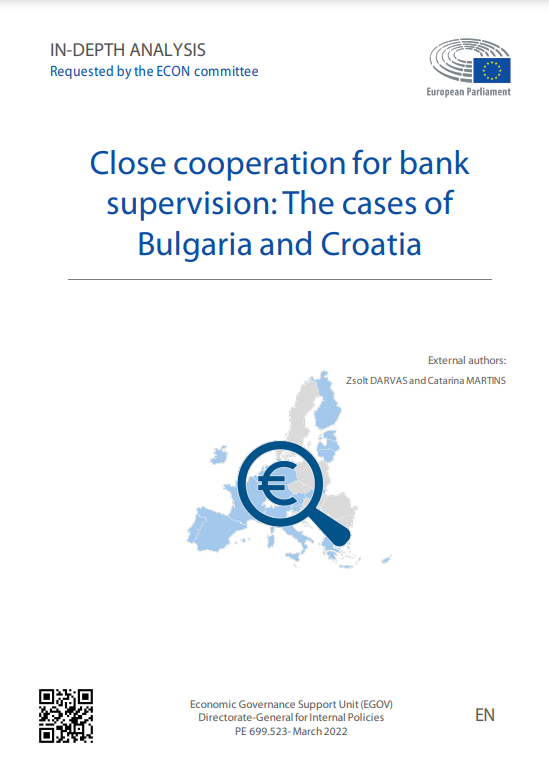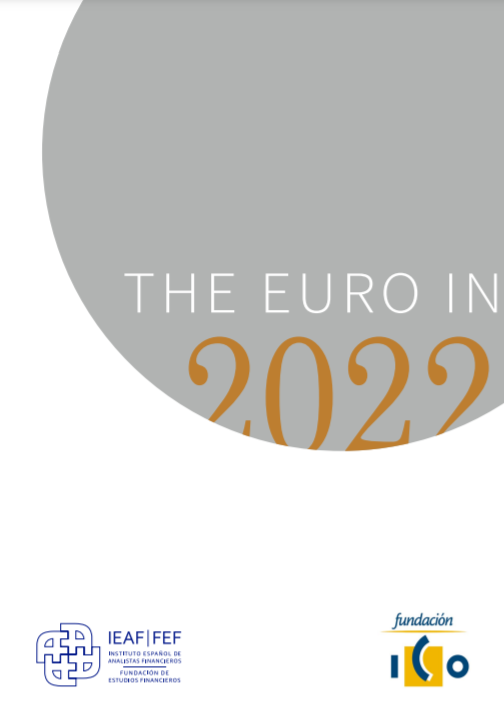Blog Post
Discretion lets Croatia in but leaves Bulgaria out of the euro area in 2023
Crucial decisions about whether a country can join the euro area depend on questionable discretionary decisions.
On 17 June 2022, the euro area’s finance ministers endorsed Croatia’s euro membership, based on assessments by the European Commission and the European Central Bank. Both institutions concluded that Croatia fulfils the conditions for euro adoption. They also judged that another candidate, Bulgaria, does not.
To join the euro, countries should meet criteria on price stability, sound and sustainable public finances, low long-term interest rates and exchange-rate stability. Their laws should also provide for central bank independence. While Croatia was considered to have met the necessary conditions, Bulgaria fell short on price stability and incompatible central bank legislation. But Croatia would also have fallen short on price stability without a discretionary adjustment – related to the choice of comparison countries – that was made to the assessment.
It should be noted that from the perspective of macroeconomic development and adjustment capacity under a fixed exchange rate, both countries are ready to enter the euro area. Bulgaria’s performance has been especially stunning: under a fixed exchange rate, the country corrected its 22% of GDP current-account deficit in 2008 to a close-to-balance position by 2010. From 2010-2021, a small surplus was maintained on average. The global financial crisis was followed by robust economic growth and Bulgaria’s export performance was similar or even better than floating-rate Czechia, Hungary and Poland, all of which benefitted from large exchange rate depreciation after 2008. Bulgaria’s gross public debt was 25% of GDP in 2021, the third-lowest value in the EU after Estonia and Luxembourg.
Croatia meanwhile had a harder time adjusting after the global financial and euro crises, but ultimately did so under a tightly managed exchange rate regime, which is encouraging for the country’s performance inside the euro area. Before joining the exchange rate mechanism (ERM II), both Bulgaria and Croatia had to fulfil various requirements, including governance reforms, and both the European Commission and ECB assessed that Bulgaria and Croatia properly implemented these reforms. Both countries have integrated into the Single Supervisory Mechanism since their entry in 2020 and their banking systems are strong.
One might welcome the European Commission and ECB decisions to exploit the grey area in the interpretation of the price stability criterion to allow Croatia to join in 2023. But this should not have been done in a way that prevented Bulgaria from joining (conditional on fixing central bank law issues). This episode highlights again the need to re-think the interpretation of the price stability criterion so that it can be applied consistently without the need for discretionary adjustments.
In this blog post, I review the Commission’s and the ECB’s justification for excluding two countries from the calculation of the price stability criterion and examine what the consequences of alternative choices would have been.
How did Croatia benefit and Bulgaria lose out?
The EU Treaty requires price stability to be measured by comparing the inflation rate in a euro candidate country with that in “the three best performing Member States in terms of price stability’’. For Croatia and Bulgaria, the Commission and ECB dropped two of the comparison countries that would normally be considered best performers, replacing them with countries with higher inflation rates.
The Treaty does not define the concept of “best performing Member States in terms of price stability”, leaving room for interpretation. The Commission and ECB define this concept as countries with the lowest inflation rates, with occasional discretionary adjustments. The Commission and the ECB provide no justification for this choice.
For the ECB, considering the lowest-inflation countries as the best performers is highly problematic. The ECB defines price stability as an inflation rate of 2% for its monetary policy framework. It thus uses a different definition of price stability for its monetary policy objective (2%) and for assessing suitability for euro membership (lowest inflation rate). The ECB only states that “The price stability criterion thus takes into account the fact that common shocks (stemming, for example, from global commodity prices) can temporarily drive inflation rates away from central banks’ targets”, leaving the definition of price stability for euro membership assessment unclear.
Two questions emerge:
- Do the lowest inflation rates correspond to ‘best’ performance?
- On what basis are discretionary adjustments made?
Too-low inflation entails risks. Since price stability is the ECB’s primary objective, and the ECB has quantified this concept as an inflation rate of 2%, it is hard to argue that the countries with the lowest inflation rates are the best performers in terms of price stability. Instead, considering the best performers to be the three countries with inflation closest to the ECB’s 2% target would be an unambiguous definition in line with Treaty provisions.
An alternative would be to measure euro-area candidates against the three countries with inflation rates closest to the euro-area average. The euro-area average is what the ECB is able to achieve when pursuing its price stability mandate, under the specific economic circumstances of the time. Euro-aspirant countries have close economic ties with the euro area and are influenced by euro-area macroeconomic developments, including inflation. Again, this definition would be unambiguous, not necessitating any ad-hoc adjustment.
Discretionary adjustments to the selection of best performers
The April 2022 inflation data, used for the Commission’s and the ECB’s assessment, indicated that the three countries with lowest all-items inflation rates were Malta (2.1%), Portugal (2.6%) and France (3.3%) (Table 1), giving an average of 2.6%.
In assessing price stability, the EU Treaty gives leeway of 1½ percentage points by which inflation rates in euro candidates can exceed the average rate of the best performers. So the application of the previous practice of the Commission and ECB would have resulted in an inflation reference value of 4.1% (2.6 + 1.5). This would have stopped both Croatia (4.7%) and Bulgaria (5.9%) from joining the euro area in 2023.
But the Commission and ECB excluded Malta and Portugal from the calculation, referring instead to France (3.2%), Finland (3.3%) and Greece (3.6%) as the best performers. This resulted in a reference value of 4.9% (average of 3.4% + 1.5), meaning Croatia squeezed in.
Malta and Portugal were excluded because they were considered outliers. The Commission and ECB used almost the same words for this decision, so I quote the Commission’s report. The Commission said that the inflation rates of Malta and Portugal were “substantially below the euro area average” and there were “country-specific factors that cannot be seen as representative of the process driving inflation in the euro area”. For Malta, the country-specific factor was the absence of energy-price inflation, which was a result of government measures. For Portugal, country-specific factors were “comparatively low energy inflation and the weaker cyclical position of the country compared with most other EU Member States”. The slow recovery from the COVID-19 crisis “reflects mainly Portugal’s large exposure to tourism and particularly aviation-based tourism, which has been heavily and durably hit by the pandemic”.
This raises three issues.
First, the exclusion of any country from the calculation is based on a discretionary decision, because the EU Treaty does not provide any guidance on excluding certain countries.
Second, the Commission’s justification refers to euro-area average inflation on multiple occasions, and also refers to a comparison with other member states. This undermines the rationale for considering the three countries with the lowest inflation rates as the best price-stability performers. Instead, the Commission’s justification would be consistent with treating as the best performers the three countries with inflation closest to the euro-area average. For the current exercise, that would be Cyprus (4.4%), Ireland (4.5%) and either Austria or Slovenia (both 4.2%), resulting in a reference value of 5.9%, which would have allowed Bulgaria to join the euro area from 2023 (if central bank law issues are fixed).
Third, the justifications used to exclude Malta and Portugal could have been used to exclude Finland, France and Greece – the countries that were used – as well (arguments could also be made for other countries):
- Energy prices grew 13.7% in Portugal, 18.3% in Finland, 18.8% in France, while the euro-area average was 24.7% (Table 1, second panel). Thus, there was also a sizeable gap between the euro-area average and Finland and France. In Croatia, Czechia, Hungary, Malta and Slovakia, energy prices increased less than in Portugal, so the Portuguese energy price increase is not really an outlier.
- Since an important concern was too-low energy price inflation, the overall index excluding energy could have been used (Table 1, third panel), leading to Greece (1.3%), Italy (1.3%) and either France or Portugal (both 1.7%) as the three best performers and a reference value of 2.9%. In this case, neither Croatia (3.4%) nor Bulgaria (3.9%) would have qualified to enter the euro area.
- The third lowest increase in food prices among EU countries was in France (1.4%), and the fourth lowest increase was in Finland (2.0%), while the euro-area average was 2.9% (Table 1, fourth panel). Thus, one could argue that unusually low food price growth could have justified the exclusion of France and Finland.
- The price stability criterion could reasonably have been assessed based on the overall index excluding energy, food, alcohol and tobacco – in other words, core inflation (Table 1, fifth panel). By excluding these volatile items, core inflation better reflects the underlying price developments. The three countries with the lowest core inflation were Greece (0.4%), Italy (1.1%) and Portugal (1.5%), with an average of 1%, leading to a reference value of 2.5%. Croatia (2.5%) would have just qualified to enter the euro area, while Bulgaria (2.6%) would have missed it by a sliver. But if both Greece and Portugal were excluded because of their weak cyclical positions (see next point), then both Croatia and Bulgaria would have qualified for the euro by a good margin. Or if the three countries with inflation rates closest to the euro-area average (2.1%) were the best performers, then both Bulgaria and Croatia would be in by a large margin.
- In terms of the weak recovery argument for Portugal, the latest Commission estimate puts the output gap at -3.3% in 2021 and +0.3% in 2022 in Portugal. But Greek output gap estimates are much lower: -5.3% in 2021 and -2.4% in 2022. Thus, the weak recovery argument would have applied more strongly to Greece than to Portugal, yet Portugal was excluded from the calculations, but Greece was included among the three best price-stability performers.
Gaming the system?
The inflation criterion is assessed over a one-year period. Euro candidate countries might be tempted to resort to techniques such as freezing administered prices or reducing consumption taxes to squeeze in under the reference value: what has been called ‘weighing-in syndrome’. This could be followed with a reversal of such measures after a country has joined the euro. Of the first eleven countries that joined the euro area in 1999, all met the inflation criterion in 1997 and 1998, but six failed to meet it in 2000. Similarly large violations occurred in later years.
Whether the intention was to help energy consumers or to foster euro introduction, Croatia has resorted to such techniques. The ECB noted that: “The rise in HICP inflation was mitigated by fiscal measures (some temporary), such as reduced VAT rates for gas, electricity and basic groceries, cuts in fuel excise duties and the freezing of margins on petroleum products.” However, neither the ECB nor the Commission measured the impact of such techniques. The energy price increase in Croatia (13.5%) was less than in the excluded Portugal (13.7%), while administered energy prices increased 7.1% in Croatia, the sixth lowest value in the EU, well below the euro-area average of 19.5% (Table 1, sixth column).
The assessments could have considered the overall index excluding administered prices for the price stability criterion (Table 1, right-hand columns), since government intervention in energy markets was the sole concern over Malta and was also an issue for Portugal. In this case, both Croatia and Bulgaria would have missed the price stability criterion, if the countries with the lowest inflation rates are considered as best performers, irrespective of whether Malta and Portugal had been excluded from the calculation or not.
Missing convergence report forecast already in the first month
The Commission’s assessment predicted that inflation in Croatia would remain below the predicted reference value by the end of 2022. This forecast proved to be wrong already in the first month after the forecast was made. The ECB assessment was more cautious by not presenting a specific forecast for Croatian inflation relative to the reference value, and noted that “Looking ahead, there are concerns about the sustainability of inflation convergence in Croatia over the longer term.”
The assessments used April 2022 inflation data. On 17 June 2022, one day after the Eurogroup’s endorsement of Croatia’s euro membership, Eurostat published detailed inflation indicators for May 2022 as well. The countries with the lowest overall inflation rates were (again, 12-month moving average rate of change): Malta (2.6%), Portugal (3.3%), France (3.5%), Finland (3.7%), Sweden (4.1%), Denmark (4.2%), Italy (4.2%) and Greece (4.6%). The euro-area average was 4.9%, while Croatian inflation was 5.4% and Bulgarian inflation 6.8%. By excluding Malta and Portugal, the reference value would have been 5.3%, preventing Croatia from joining the euro area in 2023.
While Croatia would have missed the inflation criterion by a mere 0.1 of a percentage point when using May 2022 data, in 2006 Lithuania’s euro entry was rejected on the basis of a 0.1 percentage-point gap to the 2.6% reference value, which was based on inflation rates in Sweden, Finland and Poland. Lithuania’s 2.7% inflation rate was close to the euro-area average of 2.2%. In 2006, there was a good reason to exclude Poland and Sweden from the calculation, but this was not done. Energy price increases in Poland (6.0%) and Sweden (6.9%) were significantly below the euro-area average (11.2%). The Polish zloty appreciated against the euro by 8.5% over the same period, which could have contributed to low inflation in general, and low energy price increases in particular. Not excluding even non-euro area countries with low energy price increases in 2006 but excluding two countries with low energy price increases in 2022 underlines the arbitrariness of whether a discretionary adjustment is made to the price stability reference value.
Summing up
This all shows that different adjustments – supported by arguments – could have been made to reach any of three outcomes: (1) neither Croatia or Bulgaria meet the price-stability criterion, (2) only Croatia meets the criterion, and (3) both countries meet the criterion. It is undesirable that the crucial decision of whether a country can join the euro area depends on such dubious discretionary decisions. It is time to rethink the interpretation of best performers as either those countries that are the closest to the ECB’s 2% inflation target or to the euro-area average. The latter option would also fix some of the well-known flaws of this criterion.
Recommended citation:
Darvas, Z. (2022) ‘Discretion lets Croatia in but leaves Bulgaria out of the euro area in 2023’, Bruegel Blog, 22 June
Republishing and referencing
Bruegel considers itself a public good and takes no institutional standpoint. Anyone is free to republish and/or quote this post without prior consent. Please provide a full reference, clearly stating Bruegel and the relevant author as the source, and include a prominent hyperlink to the original post.












